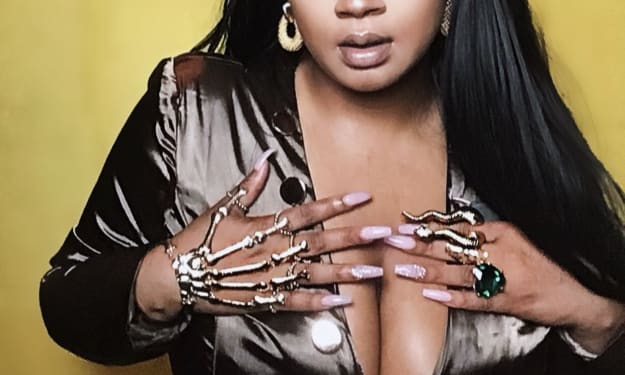Content warning
This story may contain sensitive material or discuss topics that some readers may find distressing. Reader discretion is advised. The views and opinions expressed in this story are those of the author and do not necessarily reflect the official policy or position of Vocal.
When You Lose Yourself Trying to Fix Someone Else, Remember This
It can be easy to lose ourselves in someone else's battle.

So, you’ve lost yourself trying to fix someone else.
It’s lonely and confusing.
And, you’re probably exhausted.
Navigating relationships can be complicated even in the best of circumstances.
But, when your loved one is struggling with addiction, trauma, or mental illness, these challenges can become pure chaos.
Trying to help them can begin to take on a life of it’s own.
It can be easy to get lost or overwhelmed in these relationships.
It can feel like second nature to start ignoring our own needs while we put all of our effort into helping our loved one.
We might realize that our attempts to fix them are self-defeating, but it’s just so hard to stop.
As I said, it’s complicated.
I know this because I’ve been there.
My husband was diagnosed with Borderline Personality Disorder (BPD) and Bipolar Disorder (BD) six years ago. Our relationship has been a wild ride.
Although I’m fortunate that he’s been very willing to seek professional help, the toll it’s taken on me is undeniable.
For years, despite getting therapy of my own, I felt lost in his struggles. I was so focused on how he was doing that I began to lose my own identity.
It didn’t help that I felt like people just couldn’t understand the situation I was in. Most people had one of two very polarizing thoughts on my situation -
1) Leave him. Why deal with all the drama? If it’s that bad, just leave.
2) He’s your husband and he’s ill. You should just support him and stop complaining about it.
Unfortunately, neither of these oversimplified suggestions took into account the nuance of my situation. Both lacked the compassion and understanding I truly needed at that time. I felt isolated.
And the absolute worst thing to feel when you’re already lost and confused is alone.
It took me a good six years, several hundred hours in therapy, and becoming a therapist myself to find my way back to myself.
It feels good to be me again.
But, I’ve also gained some clarity along the way.
I’ve come to realize that I was never alone. So many other people out there are struggling in the same, complicated situation I was in.
Searching for answers. Looking for validation. Wishing that someone could understand that there’s no easy solution.
I can.
I get it.
I see you.
I’ll admit that advice can be overrated, but there are a few things I wish someone had told me when I was lost trying to fix someone else.
Maybe this advice will help you too. Take what you need and leave the rest.
It’s okay. This might sound counterintuitive, but it’s okay if you’ve gotten lost. It happens to all of us sometimes. It’s not a sign of weakness, and it’s not a final destination. You’ll find your way back to yourself in time.
You’re not bad, wrong, or crazy. It’s human nature to worry about our loved ones. We’re biologically wired for connection and it’s normal to worry when those connections are threatened. If your loved one is struggling, of course it makes sense that you’d want to help. There’s nothing wrong with you.
Their behavior is not your fault. Don’t even get me started on the ‘C’ word (codependence). I don’t care what anyone says, you are not responsible for your loved one's behavior. Their choices are theirs alone. Your feelings are not the cause of their struggles.
Remember the difference between support and sacrifice. You don’t have to be a martyr. Your support and concern for someone else does not have to turn into self-sacrifice. Finding the balance here is a personal journey, and it can take time. Be gentle with yourself as you find the right balance.
Saying no will take practice. Setting boundaries can save your life and your sanity. It will always be uncomfortable at first, and it’s okay if you don’t get it right the first (dozen) times. Keep trying. It gets easier with time.
Make friends with your guilt. It’s totally normal to feel guilty for setting boundaries, stepping away, or saying no. Guilt is not a feeling we need to shy away from. We can feel it, and do what we need to do anyway.
Get comfortable being uncomfortable. Trying to rediscover ourselves in the midst of someone else’s struggle can be painful and confusing. Feel the feels. Remember that staying in your comfort zone is often a disservice.
Practice self compassion. The world is judgmental enough. The most healing thing we can do for ourselves is practice self compassion. It’s okay to make mistakes. It’s okay to have setbacks. Be kind to yourself through it all. Contrary to popular belief, shame is not an effective motivator.
Take small steps to reclaim your life. You don’t have to change everything in a day. In fact, you can’t change everything in a day. But you can take small steps every day that will make a big difference over time. Rediscover your interests, connect with other friends, join a support group, take a small break from the situation. It doesn’t matter how you do it, just commit to taking small steps that are just for you and no one else. Even 5 minutes a day will send your brain the signal that you’re important too.
Give yourself a break. Take a break from trying to figure it all out. It’s easy to get stuck in strategizing. Trying to figure out how to fix them. How to fix ourselves. For just a moment, let it all go. Take the pressure off. Amazing things happen when we allow ourselves to be still.
Losing yourself in someone else’s problems can be scary and confusing. But, it doesn’t have to be shameful or isolating.
Not everyone is going to understand what you’re going through, but I do.
Because I was you.
I think it’s so commendable that you want to help someone you love.
Just don’t forget -
You’re important too.
About the Creator
Blair Nicole
Hi there, I’m Blair Nicole— CEO, therapist, author, and self-proclaimed force to be reckoned with. I’m also a world traveler, wife, mother, enthusiastic mental health advocate, and lover of holiday sweaters.






Comments
There are no comments for this story
Be the first to respond and start the conversation.